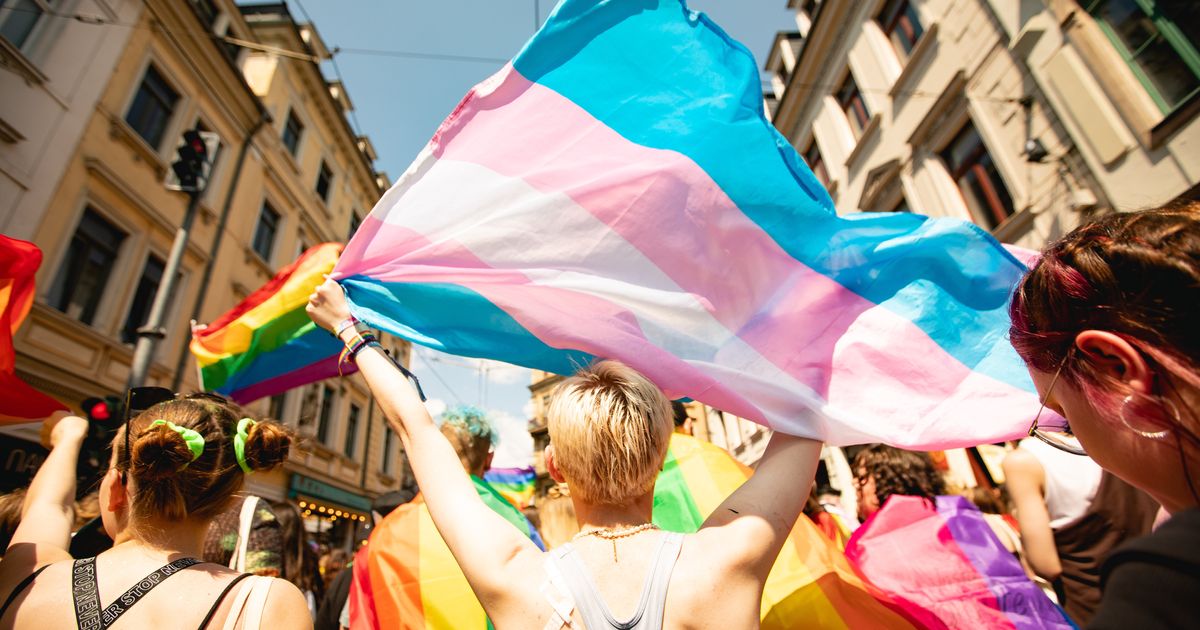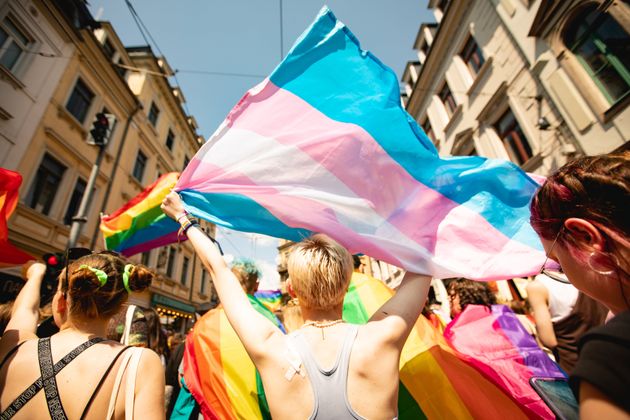The Supreme Court has just ruled that the term “woman” refers to those born as biologically female.
The landmark moment has delivered a blow to the trans community and comes after years of campaigning from gender-critical groups.
Here’s a look at how we got here, and just what that means.
What just happened?
The UK Supreme Court, operated by the five most senior judges in the country, has officially defined what a woman is.
Lord Reed, Lady Rose, Lord Lloyd-Jones, Lady Simler and Lord Hodge have all ruled sex is defined by biology.
It comes after gender-critical campaigners escalated a case looking at Scottish legislation about how to define gender.
Judges were looking at this question: “Is a person with a full GRC [gender recognition certificate] which recognises that their gender is female, a ‘woman’ for the purposes of the Equality Act 2010?”
Lord Hodge announced today: “The unanimous decision of this court is that the terms woman and sex in the Equality Act 2010 refer to a biological woman and biological sex.”
Essentially that means defining someone based on their reproductive organs and chromosomes rather than their gender identity and any gender-recognition process.
It has defined sex as binary.
Why was this issue even in the courts?
It comes after campaign groups of gender-critical women, For Women Scotland and Sex Matters, brought a case against the Scottish government to the Supreme Court.
They were fighting against legislation led by former first minister Nicola Sturgeon in 2018 which aimed to set up gender quotas for public boards.
This law recognised trans women with gender recognition certificates (GRC) as women.
But the campaigners claim sex is biological and binary.
They said the legislation had broken with the separate definition of women and trans women as explained in the 2010 Equality Act.
They claimed that sex based protections should only be offered to those who were born biologically female – and therefore not include those with a GRC.
So they began contesting the legislation in 2021 with a judicial review.
The Scottish government argued its legislation was in line with the definition of women in the Equality Act and trans women as defined by the 2004 Gender Recognition Act.
The 2004 legislation states: “Where a full gender recognition certificate has been issued to a person that their acquired gender is female, the person’s sex is that of a woman.”
The Scottish courts already ruled twice in the Scottish government’s favour, saying sex is “not limited to biological or birth sex” – including those with GRC.
So the group escalated it to the Supreme Court – meaning the ruling will now impact the whole of Britain.
How did the judges come to this decision?
Hodge said the predecessors to the Equality Act used definitions of biological sex and gender reassignment was added as a separate characteristic.
He said: “Although the word ‘biological’ does not appear in this definition, the ordinary meaning of those plain and unambiguous words corresponds with the biological characteristics that make an individual a man or a woman.
“These are assumed to be self-explanatory and to require no further explanation.
“Men and women are on the face of the definition only differentiated as a grouping by the biology they share with their group.”
Hodge also noted if people with Gender Reassignment Certificates were included in the sex group, it would make the Equality Act read in an “incoherent way”.
He said any issues linked to pregnancy and maternity can be read as referring to biological sex, but other parts of the Act referred to “certified sex”.
However, he said this ruling should not be seen as a victory for either side of the argument, and claimed trans people are still protected in the law.
What does this mean for the trans community?
Lord Hodge said the marginalised group are still protected through the Equality Act 2010 against discrimination – indirect and direct – as well as harassment.
But trans rights campaigners fear this means they will lose protections and that public bodies and organisations will change how they operate in regard to single-sex spaces.
Statista found the number of police recorded hate crimes against trans people has been rising in recent years. In 2023/24, there were 4,780 recorded incidents.
Trans women with GRCs may not be able to access women’s single-sex services.
The Good Law Project also claimed the court did not hear from a single trans person.
The campaigners added: “This ruling sets a dangerous precedent and erases trans women from protections. It puts trans rights back 20 years.”
<div class="js-react-hydrator" data-component-name="Twitter" data-component-id="1143" data-component-props="{"itemType":"rich","index":47,"contentIndexByType":1,"contentListType":"embed","code":"
","type":"rich","meta":{"author":"Good Law Project","author_url":"https://twitter.com/GoodLawProject","cache_age":86400,"description":"The Supreme Court sided with FWS. But it didn’t hear from a single trans person. This ruling sets a dangerous precedent and erases trans women from protections. It puts trans rights back 20 years. We won’t stop fighting for trans rights  — Good Law Project (@GoodLawProject) April 16, 2025\n\n\n","options":{"_maxwidth":{"label":"Adjust width","placeholder":"220-550, in px","value":""},"_theme":{"value":"","values":{"dark":"Use dark theme"}}},"provider_name":"Twitter","title":"Good Law Project on Twitter / X","type":"rich","url":"https://twitter.com/GoodLawProject/status/1912436399724216402","version":"1.0"},"flags":[],"enhancements":{},"fullBleed":false,"options":{"theme":"news","device":"desktop","editionInfo":{"id":"uk","name":"U.K.","link":"https://www.huffingtonpost.co.uk","locale":"en_GB"},"originalEdition":"uk","isMapi":false,"isAmp":false,"isAdsFree":false,"isVideoEntry":false,"isEntry":true,"isMt":false,"entryId":"67ff5f03e4b051f6e26e5e91","entryPermalink":"https://www.huffingtonpost.co.uk/entry/explained-supreme-court-has-decided-how-to-define-a-woman_uk_67ff5f03e4b051f6e26e5e91","entryTagsList":"lgbtq,transgender","sectionSlug":"politics","deptSlug":null,"sectionRedirectUrl":null,"subcategories":"","isWide":false,"headerOverride":null,"noVideoAds":false,"disableFloat":false,"isNative":false,"commercialVideo":{"provider":"custom","site_and_category":"uk.politics","package":null},"isHighline":false,"vidibleConfigValues":{"cid":"60afc140cf94592c45d7390c","disabledWithMapiEntries":false,"overrides":{"all":"60b8e525cdd90620331baaf4"},"whitelisted":["56c5f12ee4b03a39c93c9439","56c6056ee4b01f2b7e1b5f35","59bfee7f9e451049f87f550b","5acccbaac269d609ef44c529","570278d2e4b070ff77b98217","57027b4be4b070ff77b98d5c","56fe95c4e4b0041c4242016b","570279cfe4b06d08e3629954","5ba9e8821c2e65639162ccf1","5bcd9904821576674bc55ced","5d076ca127f25f504327c72e","5b35266b158f855373e28256","5ebac2e8abddfb04f877dff2","60b8e525cdd90620331baaf4","60b64354b171b7444beaff4d","60d0d8e09340d7032ad0fb1a","60d0d90f9340d7032ad0fbeb","60d0d9949340d7032ad0fed3","60d0d9f99340d7032ad10113","60d0daa69340d7032ad104cf","60d0de02b627221e9d819408"],"playlists":{"default":"57bc306888d2ff1a7f6b5579","news":"56c6dbcee4b04edee8beb49c","politics":"56c6dbcee4b04edee8beb49c","entertainment":"56c6e7f2e4b0983aa64c60fc","tech":"56c6f70ae4b043c5bdcaebf9","parents":"56cc65c2e4b0239099455b42","lifestyle":"56cc66a9e4b01f81ef94e98c"},"playerUpdates":{"56c6056ee4b01f2b7e1b5f35":"60b8e525cdd90620331baaf4","56c5f12ee4b03a39c93c9439":"60d0d8e09340d7032ad0fb1a","59bfee7f9e451049f87f550b":"60d0d90f9340d7032ad0fbeb","5acccbaac269d609ef44c529":"60d0d9949340d7032ad0fed3","5bcd9904821576674bc55ced":"60d0d9f99340d7032ad10113","5d076ca127f25f504327c72e":"60d0daa69340d7032ad104cf","5ebac2e8abddfb04f877dff2":"60d0de02b627221e9d819408"}},"connatixConfigValues":{"defaultPlayer":"16b0ecc6-802c-4120-845f-e90629812c4d","clickToPlayPlayer":"823ac03a-0f7e-4bcb-8521-a5b091ae948d","videoPagePlayer":"05041ada-93f7-4e86-9208-e03a5b19311b","defaultPlaylist":"2e062669-71b4-41df-b17a-df6b1616bc8f"},"topConnatixThumnbailSrc":"data:image/png;base64,iVBORw0KGgoAAAANSUhEUgAAAAEAAAABCAQAAAC1HAwCAAAAC0lEQVR42mNkYAAAAAYAAjCB0C8AAAAASUVORK5CYII=","customAmpComponents":[],"ampAssetsUrl":"https://amp.assets.huffpost.com","videoTraits":null,"positionInUnitCounts":{"buzz_head":{"count":0},"buzz_body":{"count":0},"buzz_bottom":{"count":0}},"positionInSubUnitCounts":{"article_body":{"count":9},"blog_summary":{"count":0},"before_you_go_content":{"count":0}},"connatixCountsHelper":{"count":0},"buzzfeedTracking":{"context_page_id":"67ff5f03e4b051f6e26e5e91","context_page_type":"buzz","destination":"huffpost","mode":"desktop","page_edition":"en-uk"},"tags":[{"name":"lgbtq","slug":"lgbtq","links":{"relativeLink":"news/lgbtq","permalink":"https://www.huffingtonpost.co.uk/news/lgbtq","mobileWebLink":"https://www.huffingtonpost.co.uk/news/lgbtq"},"section":{"title":"News","slug":"news"},"topic":{"title":"LGBTQ","slug":"lgbtq","overridesSectionLabel":false},"url":"https://www.huffingtonpost.co.uk/news/lgbtq/"},{"name":"Transgender","slug":"transgender","links":{"relativeLink":"news/transgender","permalink":"https://www.huffingtonpost.co.uk/news/transgender","mobileWebLink":"https://www.huffingtonpost.co.uk/news/transgender"},"section":{"title":"Life","slug":"lifestyle"},"topic":{"title":"Transgender","slug":"transgender","overridesSectionLabel":false},"url":"https://www.huffingtonpost.co.uk/news/transgender/"}],"isLiveblogLive":null,"isLiveblog":false,"cetUnit":"buzz_body","bodyAds":["
— Good Law Project (@GoodLawProject) April 16, 2025\n\n\n","options":{"_maxwidth":{"label":"Adjust width","placeholder":"220-550, in px","value":""},"_theme":{"value":"","values":{"dark":"Use dark theme"}}},"provider_name":"Twitter","title":"Good Law Project on Twitter / X","type":"rich","url":"https://twitter.com/GoodLawProject/status/1912436399724216402","version":"1.0"},"flags":[],"enhancements":{},"fullBleed":false,"options":{"theme":"news","device":"desktop","editionInfo":{"id":"uk","name":"U.K.","link":"https://www.huffingtonpost.co.uk","locale":"en_GB"},"originalEdition":"uk","isMapi":false,"isAmp":false,"isAdsFree":false,"isVideoEntry":false,"isEntry":true,"isMt":false,"entryId":"67ff5f03e4b051f6e26e5e91","entryPermalink":"https://www.huffingtonpost.co.uk/entry/explained-supreme-court-has-decided-how-to-define-a-woman_uk_67ff5f03e4b051f6e26e5e91","entryTagsList":"lgbtq,transgender","sectionSlug":"politics","deptSlug":null,"sectionRedirectUrl":null,"subcategories":"","isWide":false,"headerOverride":null,"noVideoAds":false,"disableFloat":false,"isNative":false,"commercialVideo":{"provider":"custom","site_and_category":"uk.politics","package":null},"isHighline":false,"vidibleConfigValues":{"cid":"60afc140cf94592c45d7390c","disabledWithMapiEntries":false,"overrides":{"all":"60b8e525cdd90620331baaf4"},"whitelisted":["56c5f12ee4b03a39c93c9439","56c6056ee4b01f2b7e1b5f35","59bfee7f9e451049f87f550b","5acccbaac269d609ef44c529","570278d2e4b070ff77b98217","57027b4be4b070ff77b98d5c","56fe95c4e4b0041c4242016b","570279cfe4b06d08e3629954","5ba9e8821c2e65639162ccf1","5bcd9904821576674bc55ced","5d076ca127f25f504327c72e","5b35266b158f855373e28256","5ebac2e8abddfb04f877dff2","60b8e525cdd90620331baaf4","60b64354b171b7444beaff4d","60d0d8e09340d7032ad0fb1a","60d0d90f9340d7032ad0fbeb","60d0d9949340d7032ad0fed3","60d0d9f99340d7032ad10113","60d0daa69340d7032ad104cf","60d0de02b627221e9d819408"],"playlists":{"default":"57bc306888d2ff1a7f6b5579","news":"56c6dbcee4b04edee8beb49c","politics":"56c6dbcee4b04edee8beb49c","entertainment":"56c6e7f2e4b0983aa64c60fc","tech":"56c6f70ae4b043c5bdcaebf9","parents":"56cc65c2e4b0239099455b42","lifestyle":"56cc66a9e4b01f81ef94e98c"},"playerUpdates":{"56c6056ee4b01f2b7e1b5f35":"60b8e525cdd90620331baaf4","56c5f12ee4b03a39c93c9439":"60d0d8e09340d7032ad0fb1a","59bfee7f9e451049f87f550b":"60d0d90f9340d7032ad0fbeb","5acccbaac269d609ef44c529":"60d0d9949340d7032ad0fed3","5bcd9904821576674bc55ced":"60d0d9f99340d7032ad10113","5d076ca127f25f504327c72e":"60d0daa69340d7032ad104cf","5ebac2e8abddfb04f877dff2":"60d0de02b627221e9d819408"}},"connatixConfigValues":{"defaultPlayer":"16b0ecc6-802c-4120-845f-e90629812c4d","clickToPlayPlayer":"823ac03a-0f7e-4bcb-8521-a5b091ae948d","videoPagePlayer":"05041ada-93f7-4e86-9208-e03a5b19311b","defaultPlaylist":"2e062669-71b4-41df-b17a-df6b1616bc8f"},"topConnatixThumnbailSrc":"data:image/png;base64,iVBORw0KGgoAAAANSUhEUgAAAAEAAAABCAQAAAC1HAwCAAAAC0lEQVR42mNkYAAAAAYAAjCB0C8AAAAASUVORK5CYII=","customAmpComponents":[],"ampAssetsUrl":"https://amp.assets.huffpost.com","videoTraits":null,"positionInUnitCounts":{"buzz_head":{"count":0},"buzz_body":{"count":0},"buzz_bottom":{"count":0}},"positionInSubUnitCounts":{"article_body":{"count":9},"blog_summary":{"count":0},"before_you_go_content":{"count":0}},"connatixCountsHelper":{"count":0},"buzzfeedTracking":{"context_page_id":"67ff5f03e4b051f6e26e5e91","context_page_type":"buzz","destination":"huffpost","mode":"desktop","page_edition":"en-uk"},"tags":[{"name":"lgbtq","slug":"lgbtq","links":{"relativeLink":"news/lgbtq","permalink":"https://www.huffingtonpost.co.uk/news/lgbtq","mobileWebLink":"https://www.huffingtonpost.co.uk/news/lgbtq"},"section":{"title":"News","slug":"news"},"topic":{"title":"LGBTQ","slug":"lgbtq","overridesSectionLabel":false},"url":"https://www.huffingtonpost.co.uk/news/lgbtq/"},{"name":"Transgender","slug":"transgender","links":{"relativeLink":"news/transgender","permalink":"https://www.huffingtonpost.co.uk/news/transgender","mobileWebLink":"https://www.huffingtonpost.co.uk/news/transgender"},"section":{"title":"Life","slug":"lifestyle"},"topic":{"title":"Transgender","slug":"transgender","overridesSectionLabel":false},"url":"https://www.huffingtonpost.co.uk/news/transgender/"}],"isLiveblogLive":null,"isLiveblog":false,"cetUnit":"buzz_body","bodyAds":["
\r\n\r\n HPGam.cmd.push(function(){\r\n\t\treturn HPGam.render(\"inline-1\", \"entry_paragraph_1\", false, false);\r\n });\r\n\r\n","
\r\n\r\n HPGam.cmd.push(function(){\r\n\t\treturn HPGam.render(\"inline\", \"entry_paragraph_2\", false, false);\r\n });\r\n\r\n","
\r\n\r\n HPGam.cmd.push(function(){\r\n\t\treturn HPGam.render(\"inline-2\", \"entry_paragraph_3\", false, false);\r\n });\r\n\r\n","
\r\n\r\n HPGam.cmd.push(function(){\r\n\t\treturn HPGam.render(\"inline-infinite\", \"repeating_dynamic_display\", false, false);\r\n });\r\n\r\n"],"adCount":0},"isCollectionEmbed":false}”>
“Yet, we have come through worse before and are not going away. Whatever the world throws at us, we will be back, each time, stronger and bolder than before.”






 — Good Law Project (@GoodLawProject) April 16, 2025\n\n\n","options":{"_maxwidth":{"label":"Adjust width","placeholder":"220-550, in px","value":""},"_theme":{"value":"","values":{"dark":"Use dark theme"}}},"provider_name":"Twitter","title":"Good Law Project on Twitter / X","type":"rich","url":"https://twitter.com/GoodLawProject/status/1912436399724216402","version":"1.0"},"flags":[],"enhancements":{},"fullBleed":false,"options":{"theme":"news","device":"desktop","editionInfo":{"id":"uk","name":"U.K.","link":"https://www.huffingtonpost.co.uk","locale":"en_GB"},"originalEdition":"uk","isMapi":false,"isAmp":false,"isAdsFree":false,"isVideoEntry":false,"isEntry":true,"isMt":false,"entryId":"67ff5f03e4b051f6e26e5e91","entryPermalink":"https://www.huffingtonpost.co.uk/entry/explained-supreme-court-has-decided-how-to-define-a-woman_uk_67ff5f03e4b051f6e26e5e91","entryTagsList":"lgbtq,transgender","sectionSlug":"politics","deptSlug":null,"sectionRedirectUrl":null,"subcategories":"","isWide":false,"headerOverride":null,"noVideoAds":false,"disableFloat":false,"isNative":false,"commercialVideo":{"provider":"custom","site_and_category":"uk.politics","package":null},"isHighline":false,"vidibleConfigValues":{"cid":"60afc140cf94592c45d7390c","disabledWithMapiEntries":false,"overrides":{"all":"60b8e525cdd90620331baaf4"},"whitelisted":["56c5f12ee4b03a39c93c9439","56c6056ee4b01f2b7e1b5f35","59bfee7f9e451049f87f550b","5acccbaac269d609ef44c529","570278d2e4b070ff77b98217","57027b4be4b070ff77b98d5c","56fe95c4e4b0041c4242016b","570279cfe4b06d08e3629954","5ba9e8821c2e65639162ccf1","5bcd9904821576674bc55ced","5d076ca127f25f504327c72e","5b35266b158f855373e28256","5ebac2e8abddfb04f877dff2","60b8e525cdd90620331baaf4","60b64354b171b7444beaff4d","60d0d8e09340d7032ad0fb1a","60d0d90f9340d7032ad0fbeb","60d0d9949340d7032ad0fed3","60d0d9f99340d7032ad10113","60d0daa69340d7032ad104cf","60d0de02b627221e9d819408"],"playlists":{"default":"57bc306888d2ff1a7f6b5579","news":"56c6dbcee4b04edee8beb49c","politics":"56c6dbcee4b04edee8beb49c","entertainment":"56c6e7f2e4b0983aa64c60fc","tech":"56c6f70ae4b043c5bdcaebf9","parents":"56cc65c2e4b0239099455b42","lifestyle":"56cc66a9e4b01f81ef94e98c"},"playerUpdates":{"56c6056ee4b01f2b7e1b5f35":"60b8e525cdd90620331baaf4","56c5f12ee4b03a39c93c9439":"60d0d8e09340d7032ad0fb1a","59bfee7f9e451049f87f550b":"60d0d90f9340d7032ad0fbeb","5acccbaac269d609ef44c529":"60d0d9949340d7032ad0fed3","5bcd9904821576674bc55ced":"60d0d9f99340d7032ad10113","5d076ca127f25f504327c72e":"60d0daa69340d7032ad104cf","5ebac2e8abddfb04f877dff2":"60d0de02b627221e9d819408"}},"connatixConfigValues":{"defaultPlayer":"16b0ecc6-802c-4120-845f-e90629812c4d","clickToPlayPlayer":"823ac03a-0f7e-4bcb-8521-a5b091ae948d","videoPagePlayer":"05041ada-93f7-4e86-9208-e03a5b19311b","defaultPlaylist":"2e062669-71b4-41df-b17a-df6b1616bc8f"},"topConnatixThumnbailSrc":"data:image/png;base64,iVBORw0KGgoAAAANSUhEUgAAAAEAAAABCAQAAAC1HAwCAAAAC0lEQVR42mNkYAAAAAYAAjCB0C8AAAAASUVORK5CYII=","customAmpComponents":[],"ampAssetsUrl":"https://amp.assets.huffpost.com","videoTraits":null,"positionInUnitCounts":{"buzz_head":{"count":0},"buzz_body":{"count":0},"buzz_bottom":{"count":0}},"positionInSubUnitCounts":{"article_body":{"count":9},"blog_summary":{"count":0},"before_you_go_content":{"count":0}},"connatixCountsHelper":{"count":0},"buzzfeedTracking":{"context_page_id":"67ff5f03e4b051f6e26e5e91","context_page_type":"buzz","destination":"huffpost","mode":"desktop","page_edition":"en-uk"},"tags":[{"name":"lgbtq","slug":"lgbtq","links":{"relativeLink":"news/lgbtq","permalink":"https://www.huffingtonpost.co.uk/news/lgbtq","mobileWebLink":"https://www.huffingtonpost.co.uk/news/lgbtq"},"section":{"title":"News","slug":"news"},"topic":{"title":"LGBTQ","slug":"lgbtq","overridesSectionLabel":false},"url":"https://www.huffingtonpost.co.uk/news/lgbtq/"},{"name":"Transgender","slug":"transgender","links":{"relativeLink":"news/transgender","permalink":"https://www.huffingtonpost.co.uk/news/transgender","mobileWebLink":"https://www.huffingtonpost.co.uk/news/transgender"},"section":{"title":"Life","slug":"lifestyle"},"topic":{"title":"Transgender","slug":"transgender","overridesSectionLabel":false},"url":"https://www.huffingtonpost.co.uk/news/transgender/"}],"isLiveblogLive":null,"isLiveblog":false,"cetUnit":"buzz_body","bodyAds":["
— Good Law Project (@GoodLawProject) April 16, 2025\n\n\n","options":{"_maxwidth":{"label":"Adjust width","placeholder":"220-550, in px","value":""},"_theme":{"value":"","values":{"dark":"Use dark theme"}}},"provider_name":"Twitter","title":"Good Law Project on Twitter / X","type":"rich","url":"https://twitter.com/GoodLawProject/status/1912436399724216402","version":"1.0"},"flags":[],"enhancements":{},"fullBleed":false,"options":{"theme":"news","device":"desktop","editionInfo":{"id":"uk","name":"U.K.","link":"https://www.huffingtonpost.co.uk","locale":"en_GB"},"originalEdition":"uk","isMapi":false,"isAmp":false,"isAdsFree":false,"isVideoEntry":false,"isEntry":true,"isMt":false,"entryId":"67ff5f03e4b051f6e26e5e91","entryPermalink":"https://www.huffingtonpost.co.uk/entry/explained-supreme-court-has-decided-how-to-define-a-woman_uk_67ff5f03e4b051f6e26e5e91","entryTagsList":"lgbtq,transgender","sectionSlug":"politics","deptSlug":null,"sectionRedirectUrl":null,"subcategories":"","isWide":false,"headerOverride":null,"noVideoAds":false,"disableFloat":false,"isNative":false,"commercialVideo":{"provider":"custom","site_and_category":"uk.politics","package":null},"isHighline":false,"vidibleConfigValues":{"cid":"60afc140cf94592c45d7390c","disabledWithMapiEntries":false,"overrides":{"all":"60b8e525cdd90620331baaf4"},"whitelisted":["56c5f12ee4b03a39c93c9439","56c6056ee4b01f2b7e1b5f35","59bfee7f9e451049f87f550b","5acccbaac269d609ef44c529","570278d2e4b070ff77b98217","57027b4be4b070ff77b98d5c","56fe95c4e4b0041c4242016b","570279cfe4b06d08e3629954","5ba9e8821c2e65639162ccf1","5bcd9904821576674bc55ced","5d076ca127f25f504327c72e","5b35266b158f855373e28256","5ebac2e8abddfb04f877dff2","60b8e525cdd90620331baaf4","60b64354b171b7444beaff4d","60d0d8e09340d7032ad0fb1a","60d0d90f9340d7032ad0fbeb","60d0d9949340d7032ad0fed3","60d0d9f99340d7032ad10113","60d0daa69340d7032ad104cf","60d0de02b627221e9d819408"],"playlists":{"default":"57bc306888d2ff1a7f6b5579","news":"56c6dbcee4b04edee8beb49c","politics":"56c6dbcee4b04edee8beb49c","entertainment":"56c6e7f2e4b0983aa64c60fc","tech":"56c6f70ae4b043c5bdcaebf9","parents":"56cc65c2e4b0239099455b42","lifestyle":"56cc66a9e4b01f81ef94e98c"},"playerUpdates":{"56c6056ee4b01f2b7e1b5f35":"60b8e525cdd90620331baaf4","56c5f12ee4b03a39c93c9439":"60d0d8e09340d7032ad0fb1a","59bfee7f9e451049f87f550b":"60d0d90f9340d7032ad0fbeb","5acccbaac269d609ef44c529":"60d0d9949340d7032ad0fed3","5bcd9904821576674bc55ced":"60d0d9f99340d7032ad10113","5d076ca127f25f504327c72e":"60d0daa69340d7032ad104cf","5ebac2e8abddfb04f877dff2":"60d0de02b627221e9d819408"}},"connatixConfigValues":{"defaultPlayer":"16b0ecc6-802c-4120-845f-e90629812c4d","clickToPlayPlayer":"823ac03a-0f7e-4bcb-8521-a5b091ae948d","videoPagePlayer":"05041ada-93f7-4e86-9208-e03a5b19311b","defaultPlaylist":"2e062669-71b4-41df-b17a-df6b1616bc8f"},"topConnatixThumnbailSrc":"data:image/png;base64,iVBORw0KGgoAAAANSUhEUgAAAAEAAAABCAQAAAC1HAwCAAAAC0lEQVR42mNkYAAAAAYAAjCB0C8AAAAASUVORK5CYII=","customAmpComponents":[],"ampAssetsUrl":"https://amp.assets.huffpost.com","videoTraits":null,"positionInUnitCounts":{"buzz_head":{"count":0},"buzz_body":{"count":0},"buzz_bottom":{"count":0}},"positionInSubUnitCounts":{"article_body":{"count":9},"blog_summary":{"count":0},"before_you_go_content":{"count":0}},"connatixCountsHelper":{"count":0},"buzzfeedTracking":{"context_page_id":"67ff5f03e4b051f6e26e5e91","context_page_type":"buzz","destination":"huffpost","mode":"desktop","page_edition":"en-uk"},"tags":[{"name":"lgbtq","slug":"lgbtq","links":{"relativeLink":"news/lgbtq","permalink":"https://www.huffingtonpost.co.uk/news/lgbtq","mobileWebLink":"https://www.huffingtonpost.co.uk/news/lgbtq"},"section":{"title":"News","slug":"news"},"topic":{"title":"LGBTQ","slug":"lgbtq","overridesSectionLabel":false},"url":"https://www.huffingtonpost.co.uk/news/lgbtq/"},{"name":"Transgender","slug":"transgender","links":{"relativeLink":"news/transgender","permalink":"https://www.huffingtonpost.co.uk/news/transgender","mobileWebLink":"https://www.huffingtonpost.co.uk/news/transgender"},"section":{"title":"Life","slug":"lifestyle"},"topic":{"title":"Transgender","slug":"transgender","overridesSectionLabel":false},"url":"https://www.huffingtonpost.co.uk/news/transgender/"}],"isLiveblogLive":null,"isLiveblog":false,"cetUnit":"buzz_body","bodyAds":["







